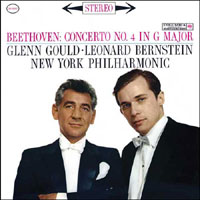Beethoven • Piano Concerto No.4 in G major
The new piano concerto arrived between the Fifth and Sixth Symphonies, and with faint reaction from the normally discerning Viennese audience, it got lost in the mix. Beethoven never played the concerto again, and within a few years he abandoned the genre entirely. Perhaps his failing hearing reduced his love for public performance. Sometimes music needs to find its era, and happily in the classical world time can turn the obscure into gold. Impex Records unearthed a 24-karat nugget when it dug into Sony’s vast Columbia vault and pulled out Glenn Gould’s recording of the No.4 with Leonard Bernstein and the New York Philharmonic. As a youngster, Gould took Beethoven’s score into his bedroom for study, only to emerge a few hours later to play the G major Concerto for the first time, note perfect and entirely from memory. At fourteen, he performed the piece with the Toronto Symphony at his public orchestral debut, and it remained special for him throughout his career. Despite being a strong-willed control freak whose talent let him perform any music in whatever manner he chose, when Gould played the Fourth he sublimated control to Beethoven, opting for the composer’s most difficult cadenzas. The G major broke with tradition, beginning not with the orchestra but with the piano. Its opening bars are a tiny hymn with a subtle genius that places the soloist (the hero) on an equal footing with the authority of the collective. Gould’s piano speaks with a poised lyricism, while the Philharmonic builds on the solo theme in a wholly different key, its response brusque with energy and action. The brief second movement opens with a turgid, almost funereal orchestra to which the piano answers sweetly. A minute longer than normal, Gould’s dramatically deliberate Andante is never lethargic. Here, the piano finds little effect from its efforts at dialog, finally launching into a cadenza so stunningly beautiful it resolves the dialectical tension and tames the gruff orchestra. In the Rondo, timpani and trumpets enter at last, as piano and orchestra intertwine in reconciliation. The music becomes spirited with infectious joy. There are points here and in the first movement where Bernstein shows a slight unwillingness to take the yoke of Gould’s phrasing, but, in true heroic fashion, the soloist wins out. The piano takes two complex cadenzas that challenge musician and instrument alike. Finally -- as if someone offstage signaled him to wrap it up -- Beethoven jacks the tempo into high gear and the piece cavorts to conclusion. I’ve heard no other recording of this work come close to Gould’s rhythmic control, tenderness and sheer conviction, all without hint of bravura. Fleisher is delicate yet occasionally rushed and automatic. Ashkenazy with the Vienna Philharmonic is marvelously dexterous yet mono-dynamic. Kempff with the Berlin Philharmonic is lighthearted -- a bit too much so -- and while I love his Chopin, Arrau just seems to mail it in. Gould owns the piece: his Andante makes Beethoven personal; his rondo is as adroit as his Bach. Here is a master at the peak of his powers playing a work he knows intimately. Like a gunslinger who files down the firing pin, Gould tweaked his Steinway for fast action and total control. The Impex reissue makes this obvious. Throughout (and especially in the solo passages), the LP lays bare the instrument: a box of strings struck by hammers, resonant and harmonic. Even at the fastest tempos, Gould’s technique yields a clear articulation of tone, nuance and dynamic on each note from each hand. In a fine confluence of sound and performance, Columbia engineered an impeccable sonic balance between soloist and orchestra. Today, Impex brings us a vinyl remaster as fresh, clear, and full-bodied as the day it was captured in 1961. Kevin Gray’s all-analog remaster of this six-eye gem turns a perfect triple Lutz into a quadruple Axel. Gray does not try to make an audiophile diva from an already fine recording, and the quiet, tick-free 180-gram vinyl really sticks the landing. If your
collection is missing Beethoven’s Fourth Piano Concerto, it lacks an essential piece
of classical music. If it lacks Glenn Gould’s
version, you are missing a quintessential performance. |

